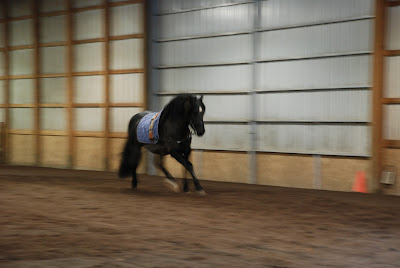Winter Horse Training Tips
When winter finally arrives - and it will - motivation to keep your horses in full training can often wane.
There are many stellar reasons to take a step back and modify the training schedule. Not just you, but also your horses would likely appreciate an abbreviated work program. One that allows them some respite and downtime to refresh.
In the North-East U.S.A, inclement weather often makes for a slip/slide affair on outside arenas. Those blessed with access to an indoor arena are obviously much more inclined to keep a full work program on point than those folks that need to work around snow and ice and dark evenings with no lights outside.
Professional trainers will often opt for heading South, Florida and South Carolina being the most popular destinations. You only have to look at the events calendar on our publication to see that the Florida Winter Circuit is already to go. With just a small list of local events to attend, the page is full of tempting sunny locations for winter work and competition.
Horses do seem to actually love the winter. And do enjoy keeping some level of activity up under saddle to keep their minds busy and bodies active.
 |
| Willowview Hill Farm, located in Stamford NY, keeps all horses in training all winter long. And even Grand Prix horses like this one enjoy long turnouts. |
But what training can you do to keep your horses ticking over during winter months and how best can you take advantage of the quieter moments on the farm? Here are some tips on how to accomplish that -
Winter is....
A great time to train your young horses to longe and free longe. Boot and wrap them if needs be to avoid injury from slipping over or catching a hoof with a shoe, but get them active.
An opportunity to take advantage of breaks in the weather to get out in the fields and ride. The fresh air is good for the lungs for both horse and rider. The horse has a long neck so cold air is not a big problem for the healthy horse.
Often a peaceful time at the barn - these quieter times offer more opportunity for training new tasks where the horse can focus wholly on the rider, without interruption from others using the space. Try and pick those very quiet times for best results. Added bonus, it is always good for any horse to be used to working in a space alone versus company.
Winter is also a great time for social equine horse events that include a good dose of education. Here our very own publisher, Horse in a Kilt Media's Paul Alvin-Smith - Grand Prix dressage trainer, is training an ANCCE Andalusian stallion at home
(above photo) and also can be found out and about regularl giving clinics (below photos).
Always park your horse trailer in a handy, accessible location and keep the snow plowed out for easy hook up. Even if you are not going to a clinic it is always important to have it handy in case of an emergency.
Don't forget to clear the 'clutter' from horse areas, especially those where you plan to exercise your horse. Safety first!
Take advantage of winter riding gear to ensure you are comfortable temperature wise - otherwise you will be tense when you ride and that will translate into a tense horse beneath you. Insulated/heated riding boots, heated vests/jackets, ear warmers and of course, gloves!










